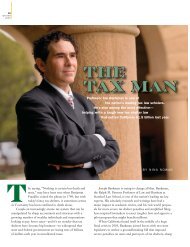Fall 1996 – Issue 50 - Stanford Lawyer - Stanford University
Fall 1996 – Issue 50 - Stanford Lawyer - Stanford University
Fall 1996 – Issue 50 - Stanford Lawyer - Stanford University
Create successful ePaper yourself
Turn your PDF publications into a flip-book with our unique Google optimized e-Paper software.
Are you concernedby the way<br />
some ofthese markets depend on<br />
there being an economic gap<br />
between sellers andbuyers?<br />
Very much. If we see a market that<br />
wouldn't exist except for the fact<br />
that people are in desperate poverty,<br />
there's something wrong.<br />
Libertarians might argue that it's<br />
a choice issue: Ifyou'drather sell<br />
a kidney, than, say, sellyour<br />
child into slavery making rugs,<br />
then sell your kidney.<br />
Well, they would, and it's a rather<br />
powerful argument. They carry it<br />
all the way, too. Many libertarians<br />
would maintain that if someone<br />
says, "Your money or your life,"<br />
and you choose to give up the<br />
money, that's a perfectly rational<br />
decision. You and I tend to think<br />
that's coercion, and therefore we<br />
shouldn't let it happen. But the<br />
issue of what's coercive is very, very<br />
complicated, because it depends on<br />
what we think people ought to have<br />
as a matter of right; then if they are<br />
put in a position where they have to<br />
give that up, we say it's coercive.<br />
Libertarians think that coercion<br />
is a lot narrower category than<br />
some other people think it is. But<br />
everybody believes there's some<br />
Sit-in protest by children in servitude, New Delhi, India<br />
such thing as coercion. It has to do<br />
with a current buzzword in legal<br />
scholarly circles: "baseline"-what<br />
you start out with that others<br />
shouldn't be able to force you to<br />
gIve up.<br />
If you think there's a pretty big<br />
baseline-like people shouldn't<br />
have to give up a kidney even if<br />
they're starving-then the whole<br />
economic system could be considered<br />
coercive, because it's getting<br />
people to choose to give up their<br />
kidneys. But if we see the baseline<br />
as much narrower, so coercion has<br />
to involve the threat of physical<br />
violence, then the focus is more<br />
conservative.<br />
That's a complicated issue and<br />
one reason I had to write a lot of<br />
philosophy in this book.<br />
I worry about the people who are<br />
selling, in effect, themselves.<br />
Yes-but the implications go way<br />
beyond those individuals. Markets<br />
touching on people's personhood<br />
affect not just the sellers, but also<br />
everyone in their general situation-and,<br />
in some sens , all of us.<br />
If you decide that something<br />
inside the body, or something that<br />
was formerly thought to be inseparable<br />
from a person, is a commodity<br />
belonging to a person, it could<br />
end up being bad for that person.<br />
Take baby selling: What if we<br />
decided that a woman's capacity to<br />
bring forth babies is a commodity<br />
that she owns? At first it looks<br />
good for her, because now she has<br />
more wealth. But if that wealth is<br />
taken into account when they<br />
decide whether to give her welfare,<br />
then it's bad for her.<br />
Why do you say it affects all of<br />
us?<br />
There's potentially a domino effect.<br />
Suppose we say that people are<br />
unique and not marketable objects,<br />
but at the same time we permit the<br />
selling of children. A child who has<br />
been acquired that way would have<br />
a confu ed self-conception: "If I<br />
was a market object, how did I<br />
change over into being a unique<br />
person?" The concepts are contradictory.<br />
And suppose a kid who was<br />
purchased says to my kids, "I was<br />
worth $<strong>50</strong>,000. How much are you<br />
worth?" That would be pretty confusing<br />
to my kids.<br />
Beyond that, it's not much of a<br />
stretch to speculate that, depending<br />
on the culture, light-skinned babies<br />
might command higher prices than<br />
dark ones, and boy babies more<br />
than girls. If parentage is con idered,<br />
babies from high-IQ or tall<br />
stock might also go for a premium.<br />
Price differences like these might<br />
even be advertised.<br />
This would change what all<br />
kids think of them elves, whether<br />
or not they personally have been<br />
sold. And since each of us begins as<br />
a kid, it perhaps changes what<br />
everybody thinks about being a<br />
human.<br />
What can we do about it?<br />
I don't have an easy answer. One<br />
solution is politically impossible:<br />
redistribute th wealth, so that we<br />
don't have people so desperately<br />
poor that they're doing things that<br />
Continued on page 32<br />
FALL <strong>1996</strong> STANFORD LAWYER 13
















